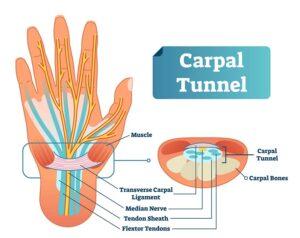Carpal Tunnel Syndrome (CTS) is a common condition that affects millions of people worldwide. It occurs when the median nerve, which runs from the forearm into the palm of the hand, becomes compressed or squeezed at the wrist.
This can lead to a range of symptoms, including numbness, tingling, and weakness in the hand and fingers. However, these symptoms can sometimes be confused with other conditions. In this post, our physical therapy experts explore some of the symptoms of carpal tunnel, how a physical therapist can alleviate your discomfort, and when surgery may be necessary.
Understanding Carpal Tunnel Symptoms:
The symptoms of Carpal Tunnel Syndrome can vary from person to person, but they often include:
- Numbness or tingling in the thumb, index, middle, and ring finger.
- Pain or discomfort in the wrist, hand, or forearm, which may radiate up the arm.
- Weakness in the hand or difficulty gripping objects.
- Worsening symptoms at night or after repetitive hand movements.
It’s important to note that these symptoms can also be caused by other conditions, such as arthritis or tendonitis. If you’re experiencing any of these symptoms, it’s essential to seek a proper diagnosis from a qualified healthcare professional.

How a physical therapist can alleviate Carpal Tunnel Syndrome:
Physical therapy can be highly effective in relieving the symptoms of Carpal Tunnel Syndrome and improving hand function. A physical therapist will work with you to develop a personalized treatment plan based on your specific needs and goals. This may include:
- Stretching and Strengthening Exercises: Specific exercises can help to improve flexibility and strength in the muscles of the hand and wrist, reducing strain on the median nerve.
- Nerve Gliding Exercises: These exercises can help to mobilize the median nerve, reducing compression and improving nerve function.
- Ergonomic Modifications: Your physical therapist can provide guidance on proper ergonomics and workstation setup to reduce strain on the wrists and hands during daily activities.
In addition to these interventions, your physical therapist may also use techniques such as manual therapy, ultrasound, electrical stimulation, (or a corticosteroid injection/steroid injection from Synergy’s orthopaedic and spine surgeon Dr. Tan) to further alleviate symptoms and promote healing.
Should I wear a wrist splint for my carpal tunnel?
A wrist splint may alleviate cts symptoms, especially at night or during activities that aggravate the condition. Wearing a splint can help keep the wrist in a neutral position, relieving pressure on the median nerve. If you’re doing any activities that involve repetitive hand movements, such as typing or using a mouse, a wrist splint can support the wrist and prevent further irritation of the median nerve.
When do you need Carpal Tunnel surgery?
In some cases, conservative treatments may not provide sufficient relief, and surgery may be necessary to alleviate symptoms and prevent further damage to the median nerve. Surgery for Carpal Tunnel Syndrome typically involves releasing the transverse carpal ligament, which helps to relieve pressure on the median nerve.
Surgery may be recommended if:
- Symptoms are severe and significantly impact daily activities.
- Symptoms persist despite conservative treatments.
- There is evidence of nerve damage or muscle weakness.
It’s essential to discuss the risks and benefits of surgery with your healthcare provider and to explore all conservative treatment options before considering surgery. However, in severe cases of Carpal Tunnel Syndrome this may be a necessary step.
Are you experiencing symptoms of Carpal Tunnel Syndrome?
A physical therapist or sports medicine specialist can play a crucial role in alleviating your symptoms and improving hand function through personalized treatment interventions. By understanding the symptoms of Carpal Tunnel Syndrome and seeking timely treatment, you can effectively manage your condition and prevent further complications.
If you think you may have nerve compression in your arms, please see a qualified medical professional, such as a registered physiotherapist, who can help you sort it out. Schedule a same day appointment at Synergy Rehab now!







